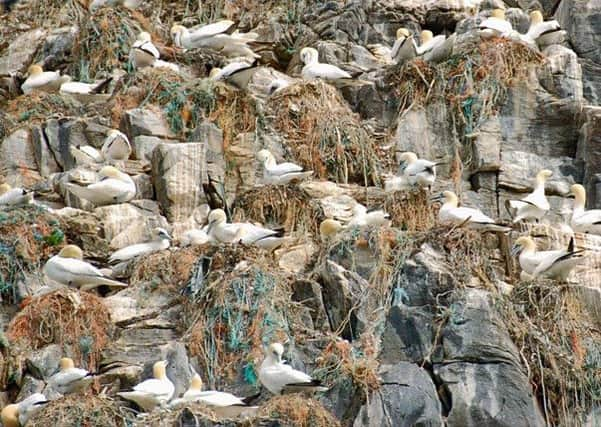Guga birds killing ban petition gains support


The petition was started on online social action network Care2 and was started following the first ever World Guga-eating Championships staged in Lewis last month.
The meat of the young gannet, known in Gaelic as guga, is a delicacy in the Ness area of Lewis.
Advertisement
Hide AdAdvertisement
Hide AdEach year islanders carry out a traditional cull of the chicks on the rocky islet of Sùla Sgeir.
Although the seabirds are protected under European Union law, islanders have exemption to cull 2,000 during the annual tradition.
But, widespread coverage of the guga-eating championships prompted an online petition to begin on Care2, which claims to be “the largest online community of people passionate about making a difference” with a membership of 23 million people.
The petition states: “Scotland prides itself on being a relatively progressive country.
“It certainly has tougher conservation and animal welfare laws than the rest of the UK. Wildlife crimes that people can commit with impunity in England, for example, could, and often would, lead to arrest, prosecution and even prison in Scotland.
“This makes it all the more shocking that a grotesque gannet chick eating contest has started on the Isle of Lewis in the Outer Hebrides, organised by a local football club. Contestants race to guzzle half a chick in the least amount of time.
“This would be illegal anywhere else in Scotland – seabirds are protected.
“But the residents of Ness district get a special licence to slaughter some 2,000 gannets a year, supposedly in the name of tradition. Hitting gannet chicks with sticks is a “tradition” we could do without.
Advertisement
Hide AdAdvertisement
Hide Ad“Tell the local council that the 21st century started a while ago and demand they ban the killing of seabird chicks, full stop.”
Oil rig worker Peter Macritchie, 33, who lives in Glasgow, became Scotland’s champion at eating pickled baby gannets last month.
He took just 3 minutes 44 seconds to consume half a guga and a stipulated 400 grammes of potatoes. Eight competitors, including one woman, took part.
The guga, also known for their overpowering odour during cooking, are hunted on Sùla Sgeir, the last place in the UK where young gannets are culled for their meat.
The hunting of seabirds was outlawed in 1954 in the UK, but the community of Ness on the Isle of Lewis continues to be granted the only exemption under UK and EU law allowing them to hold the annual hunt.
Every August, ten men from Ness set sail for Sula Sgeir, a desolate island far out in the Atlantic.
The men live on the island for two weeks, sleeping amongst ruins left behind by monks over a thousand years ago. They work ceaselessly, catching, killing and processing 2,000 birds using traditional methods unique to the hunt.
After the unusual event, one of the organisers Donald Macsween, said the real prize was “the honour and the glory of being world champion”.
Advertisement
Hide AdAdvertisement
Hide AdHe added: “The guga is an important part of our heritage and history and very much a part of who we are in Ness. We are very proud of the guga.”
Care2 was started back in 1998 and Randy Payntor, the president and chief executive officer, claims in his welcome on their website: “We started Care2 to help make the world a better place.
“The idea is simple: Make it easy for everyone to live a healthy, green lifestyle and impact the causes they care about most.
“Care2 provides powerful tools to make a difference in your life, your community, and the world. Our website is driven by passionate people who want to restore the world’s balance.”